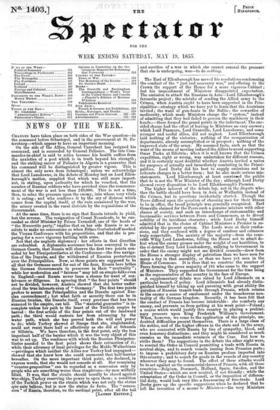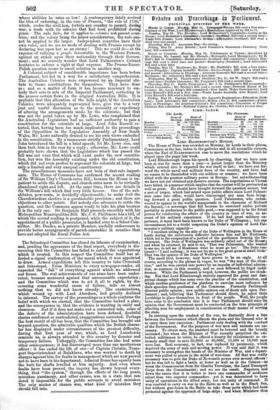The Earl of Ellenborough has moved his resolutions condemning the
conduct of the " just and necessary war," and offering to the Crown the support of the House for a more vigorous Cabinet ; but his impeachment of Ministers disappointed expectation. The omission to attack the Russians in Asia—Lord Ellenborongh's favourite project ; the mistake of sending the Allied army to the Crimea, when Austria ought to have been supported in the Prin- cipalities—strategy which we have yet to learn that the Austrians invited ; the want of gun-boats in the Baltic ; the cowardice of mediocrity, which made Ministers charge the "system," instead of admitting that they had failed to govern the machinery in their hands ;—these formed the grand points in the indictment. The one- sided charge had the effect of leaving to Ministers an easy answer; which Lord Panmnre, Lord Granville, Lord Lansdowne, and some younger and useful allies, did not neglect. Lord Ellenborough said nothing of the victories ; nothing of the reorganization of departments, already accomplished or in prospect ; nothing of the improved state of the army. He assumed facts, such as that the want of the means of moving induced the Allies to avoid supporting!, Omar Pasha at Silistria ; when it is well known that the Crimea expedition, right or wrong, was undertaken for different reasons, and it is certainly most doubtful whether Austria invited a union for purposes of actually and immediately combating in the Princi- palities. Lord Derby did his best to supply omissions and to reiterate charges in a better form ; but he also made serious mis- statements. Lord Ellenborough at least convineed the public that he is not the War Minister of the day ; although Lord Derby showed every disposition to be Lord Ellenborough's Premier.
The higher interest of the debate lay, not in the dispute whe- ther the battle should have been in Asia or Wallachia instead of the Crimea, but in questions incidentally started. Though the Peers differed upon the question of choosing men for their fitness to be in office, the broad principle was generally recognized. Earl Granville claimed for the Peers such a genuine mixture with other classes of society, and such an interchange of statesmanlike and businesslike services between Peers and Commoners, as to divest nobility of its invidious character ; while Lord Derby himself admitted that in the choice of Cabinet Ministers a Premier is re- stricted by the present system. The Lords were at their confes- sions, and they confessed with a degree of candour and calmness truly respectable. The anxiety of the majority—from the vene- rable Whig Lord Lansdowne, telling the House not to admit de- feat when the enemy groans under the weight of our hostilities, to the ci-devant Tory Lord Londonderry, rallying to Government in order that the enemy might not see divided councils—drew from the House a stronger display of patriotism than we have seen for many a day in that assembly, or than we have yet seen in the Nouse of Commons. It is thus that we construe the number of Peers forming the gross majority of 181 who came to the support of Ministers. They supported the Government for the time being as the representative of the country in the face of Europe.
A supplementary debate was raised by Lord Albemarle on a particular branch of policy. Lord Albemarle had already distin- guished himself by taking up and pursuing with great ability the question of Russian transit-trade through Prussia, whioh retains to the enemy a source of emolument under the treacherous neu- trality of the German kingdom. Recently, it has been felt that the conduct of Prussia has become intolerable : she comforts our enemy, and prevents us from getting at his weak point—Poland ; a course which would justify this country in placing a prelimi- nary pressure upon King Frederick William's Government. When, however, we come to the application of the principle, un- doubted difficulties present themselves. There is a large class of the nobles, and of the higher officers in the state and in the army, who are connected with Russia by ties of sympathy, blood, and even honorary distinctions; and they might be considered as much enemies as the immediate retainers of the Czar. But how to strike them ? The suggestions in the debate the other night were, to rescind the Order in Council permitting a trade with Russia in neutral ships, and to search vessels issuing from Prussian ports ; to impose a prohibitory duty on Russian produce imported into this country ; and to search for goods in the vessels of any country wherever they may be found. The effect of these attacks would be to set against us the commercial classes of Prussia, with all those countries—Belgium, Denmark, Holland, Spain, Sweden, and the -United States—which are now neutral, if not friendly ; while the retractation of the Order in Council, or the imposition of differen- tial duty, would look very like a forswearing of free-trade. Lord Derby gave up the specific suggestions when he declared that he left the invention of a means to Ministers—the very Ministers
whose abilities be rates so low ! A contemporary lately revived the idea of enforcing, in the ease of Prussia, "the rule of 1756," which, under the civil law, forbids any country to permit, during
war, a trade with its colonies that had been prohibited during peace. The rule fails, for it applies to colonies not parent coun-
tries; and the colony being the minor consideration, the rule can- not be applied to the larger. Independent countries have their own rules, and we see no mode of dealing with Prussia except by
declaring war upon her as an enemy ! This we could do—at the expense of rallying a people favourable to the Western Powers, against an attack upon their nationality through their Govern- ment; and we scarcely wonder that Lord Palmerston's Cabinet hesitates to enforce a right at that expense. The Prusso-Russo- Polish question seems to await solution in another way. A Colonial subject of considerable importance has been before Parliament, but not in a way for a satisfactory comprehension. The Australian Colonies were empowered by an Imperial sta- tute to frame constitutions for themselves. They have done so ; and as a matter of form it has become necessary to em- body their acts in acts of the Imperial Parliament, correcting in the process certain flaws in the original Australian Bills. It is probable that this alteration of the bills might, if the Australian Colonies were adequately represented here, give rise to a very just and useful discussion as to the necessity or expediency of altering the arrangements made by the colonists ; but that was not the point taken up by Mr. Lowe, who complained that the Australian Legislature had no sufficient authority to pass a constitution for the colonists at large. Lord John Russell re- torted, that, having been too much implicated in the proceedings of the Opposition in the Legislative Assembly of New South Wales, Mr. Lowe naturally desired to see his own views embodied in the constitution. By a mauceuvre strictly Parliamentary, Lord John introduced the bill in a brief speech, let Mr. Lowe rise, and then took him in the rear by a reply ; otherwise, Mr. Lowe could probably have shown that the Legislature which has passed the bill was not even that which will exist under the new constitu- tion, but was the Assembly existing under the old constitution, which did not even profess to represent the colonists at large, but only a limited and very unequal constituency. The miscellaneous measures have not been of first-rate import- ance. The House of Commons has confirmed the second reading of Sir William Clay's Church-rates Bill ; because the House is im- patient to settle the dispute, and church-rates seem to be virtually abandoned right and left. At the same time, there are details in Sir William's bill which find very little favour. One of the sub- stitutes, pew-rents, is decidedly objectionable ; to make both the Churchwardens elective is a questionable provision ; and there are objections to other points. But nobody else advances to settle the question, and the Commons appear ready to take his plan because it is the only one. Sir Benjamin Hall proceeds smoothly with his Metropolitan Municipalities Bill. Mr. J. G. Phillimore has a bill, of which the second reading is postponed, while the subject of it, the appointment of a public prosecutor, is handed over to a Select Com- mittee. Mr. Deedes, as a private Member, usefully endeavours to provide better arrangements of parish-constables in counties that have not adopted the Rural Police Act.



























